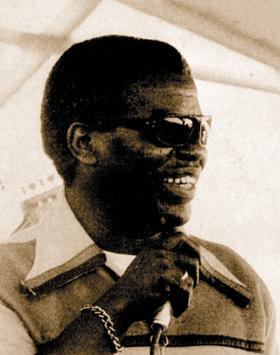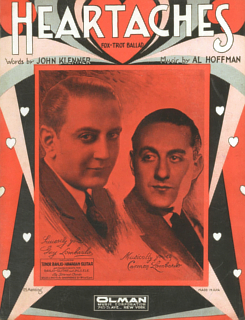Related Research Articles

David Louis Bartholomew was an American musician, bandleader, composer, arranger, and record producer. He was prominent in the music of New Orleans throughout the second half of the 20th century. Originally a trumpeter, he was active in many musical genres, including rhythm and blues, big band, swing music, rock and roll, New Orleans jazz, and Dixieland. In his induction into the Rock and Roll Hall of Fame, he was cited as a key figure in the transition from jump blues and swing to R&B and as "one of the Crescent City's greatest musicians and a true pioneer in the rock and roll revolution".

Christophe Kenner was an American, New Orleans-based R&B singer and songwriter, best known for two hit singles in the early 1960s, "I Like It Like That" and "Land of 1000 Dances", which became staples in the repertoires of many other musicians.
"Begin the Beguine" is a popular song written by Cole Porter. Porter composed the song during a 1935 Pacific cruise aboard the Cunard ocean liner Franconia from Kalabahi, Indonesia, to Fiji. In October 1935, it was introduced by June Knight in the Broadway musical Jubilee, produced at the Imperial Theatre in New York City.
"You Always Hurt the One You Love" is a pop standard with lyrics by Allan Roberts and music by Doris Fisher. First recorded by the Mills Brothers, whose recording reached the top of the Billboard charts in 1944, it was also a hit for Sammy Kaye in 1945.
"Hearts of Stone" is an American R&B song. It was written by Eddie Ray and Rudy Jackson, members of the San Bernardino, California-based rhythm and blues vocal group the Jewels which first recorded it for the R&B label in 1954. The Jewels began as a gospel group, then became the Marbles, recording for the Lucky label out of Los Angeles. According to Johnny Torrence, leader of the Marbles/Jewels, it was taken from a song they recorded in their gospel days.

"I Don't See Me in Your Eyes Anymore" is a popular song, written by Bennie Benjamin and George David Weiss and published in 1949. The song was popularized that year by Gordon Jenkins and His Orchestra and by Perry Como.

"Heartaches" is a song written by composer Al Hoffman and singer John Klenner and originally published in 1931. A fast-tempo instrumental version of the song by Ted Weems and his Orchestra became a major hit in 1947, topping the Billboard Best Selling Singles chart. Later versions by band leader Harry James and doo-wop group the Marcels were also chart successes. "Heartaches" received renewed attention in the 2010s after several 1930s recordings of the song, including a version by Sid Phillips & his Melodians with Al Bowlly, were sampled in the Caretaker's album Everywhere at the End of Time.
"Thinking of You" is a popular song, composed by Harry Ruby with lyrics by Bert Kalmar. It was introduced in the Broadway show, The Five O'Clock Girl (1927) when it was sung by Mary Eaton and Oscar Shaw.
"Red Sails in the Sunset" is a popular song. Published in 1935, its music was written by Hugh Williams with lyrics by prolific songwriter Jimmy Kennedy. The song was inspired by the "red sails" of Kitty of Coleraine, a yacht Kennedy often saw off the northern coast of Northern Ireland and by his adopted town Portstewart, a seaside resort in County Londonderry.

"Ain't That a Shame" is a song written by Fats Domino and Dave Bartholomew. Domino's recording of the song, originally stated as "Ain't It a Shame", released by Imperial Records in 1955, was a hit, eventually selling a million copies. It reached number 1 on the Billboard R&B chart and number 10 on the pop chart. The song is ranked number 438 on Rolling Stone magazine's 500 Greatest Songs of All Time list.
"The Little White Cloud that Cried" is a popular song written by Johnnie Ray and published in 1951.
"Harbor Lights", is a popular song with music by Hugh Williams and lyrics by Northern Irish songwriter Jimmy Kennedy. The song was originally recorded by Roy Fox & his Orchestra with vocal by Barry Gray in London January 29, 1937. Another famous early version was recorded by American singer Frances Langford in Los Angeles September 14, 1937, and was published again in 1950.

"Tell Me Why" is a popular song, written by Titus Turner in 1956. It is a slow, strong rhythm and blues ballad, and has a melody reminiscent of "Just a Closer Walk with Thee". The first hit version was by Marie Knight, a black R&B singer, on the Mercury's subsidiary label, Wing. It was a local hit in New Orleans and Texas.
"The Gypsy" is a popular song written by Billy Reid and published in 1945. The ballad tells the story of a person who visits a Gypsy fortune teller and is reassured that their partner is faithful. Though they both know it to be untrue, the narrator resolves to return, "'Cause I want to believe the Gypsy".

"Once a Day" is a song written by Bill Anderson and recorded as the debut single by American country artist Connie Smith. It was produced by Bob Ferguson for her self-titled debut album. The song was released in August 1964, topping the Billboard country music chart for eight weeks between late 1964 and early 1965. It was the first debut single by a female artist to reach number one on the Billboard Hot Country Songs. This song peaked at number one for the week of November 28, 1964, and it stayed at number one for eight consecutive weeks, a record for a female solo artist for nearly 50 years, until it was surpassed by Taylor Swift's "We Are Never Ever Getting Back Together" in December 2012.

"Tell Me a Lie" is a song composed by Mickey Buckins and Barbara Wyrick. Originally recorded by Lynn Anderson for her 1974 What a Man My Man Is album, it was released later that same year as a single by Sami Jo Cole, who took it to number 21 on both of the major U.S. pop charts. It also charted in Canada (#17). Cole's version was also an Adult Contemporary hit, reaching number 14 in the U.S. and number 27 in Canada.
"If I Didn't Care" is a song written by Jack Lawrence that was sung and recorded by the Ink Spots featuring Bill Kenny in 1939.
"One Night" is a song written by Dave Bartholomew, Pearl King, and Anita Steiman. It originally was an R&B hit for Smiley Lewis in 1956, before being recorded with greater commercial success by Elvis Presley in 1958.
"(I Love You) for Sentimental Reasons" is a popular song written by Ivory "Deek" Watson, founding member of the Ink Spots and of the Brown Dots, and William "Pat" Best, founding member of the Four Tunes.
"Ciribiribin" is a merry Piedmontese ballad, originally in three-quarter time, composed by Alberto Pestalozza in 1898 with lyrics by Carlo Tiochet. It quickly became popular and has been recorded by many artists. Decades later it enjoyed continued popularity with swing and jazz bands, played in four-four time.
References
- ↑ "It's a Sin to Tell a Lie - Fats Waller | Song Info". AllMusic . Retrieved 2016-08-22.
- ↑ "Victor 25342 (Black label (popular) 10-in. double-faced)". Discography of American Historical Recordings. UC Santa Barbara Library. Retrieved March 12, 2021.
- ↑ "ARCHIVE OF RECORDED 78 RPM RECORDS". 78records.cdbpdx.com. Retrieved 2016-08-22.
- ↑ Neal Pomea. "Joe Falcon & Cleoma Breaux" . Retrieved 2017-06-22.
- ↑ Whitburn, Joel (2013). Joel Whitburn's Top Pop Singles, 14th Edition: 1955-2012. Record Research. p. 779.
- ↑ Whitburn, Joel (2004). The Billboard Book Of Top 40 Country Hits: 1944-2006, Second edition. Record Research. p. 383.
- ↑ "The Other John Denver Discography". Math.hmc.edu. Archived from the original on 2009-06-02. Retrieved 2016-08-22.
- ↑ Roberts, David (2006). British Hit Singles & Albums (19th ed.). London: Guinness World Records Limited. p. 375. ISBN 1-904994-10-5.
- ↑ Joel Whitburn's Top Pop Singles 1955–1990 - ISBN 0-89820-089-X
- ↑ Fallout New Vegas Radio - It's A Sin To Tell A Lie , retrieved 2022-02-08